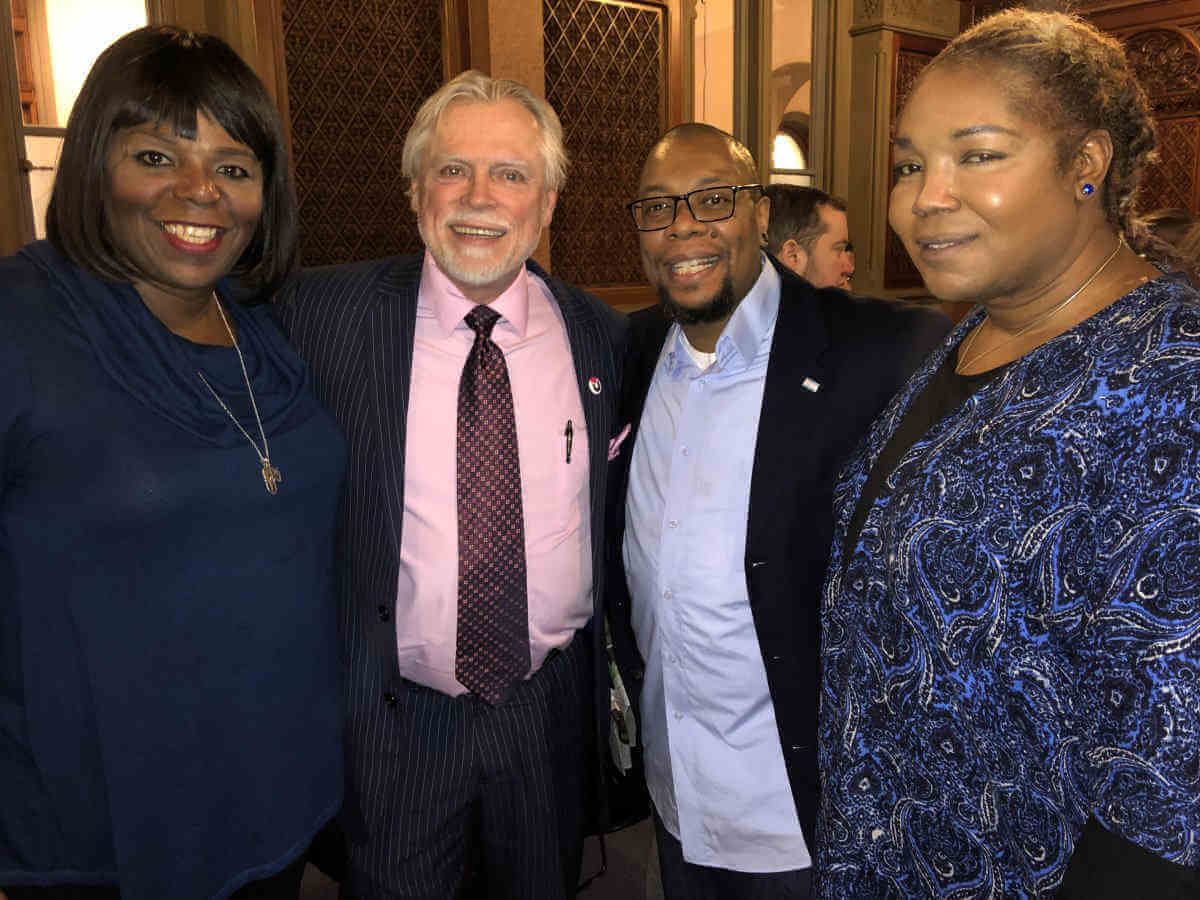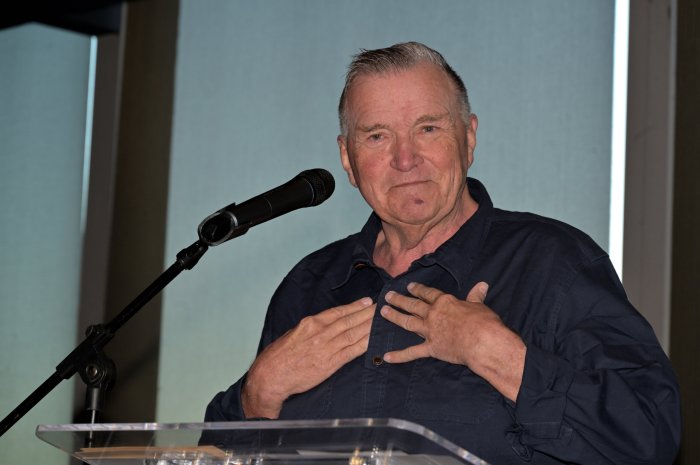In an historic day at the State Capitol in Albany, with many LGBTQ advocates on hand, both houses of the Legislature adopted two long-stalled civil rights bills — the Gender Expression Non-Discrimination Act (GENDA), a transgender rights measure, and a ban on conversion therapy practiced on minors by licensed mental health professionals.
In a fitting opening to the day’s session in the Senate, which had been the roadblock to both measures, Rabbi Yael Rapport from Congregation Beit Simchat Torah, Manhattan’s LGBTQ congregation, offered the invocation.
The January 15 passage of GENDA caps a struggle dating back 16 years to when the state adopted a gay rights law with no provisions to bar discrimination based on gender identity and expression. At the time, leading advocacy groups, led by the now defunct Empire State Pride Agenda, argued the measure approved was the best that could be achieved with a Republican-led State Senate and a Republican governor, George Pataki.
The transgender community was promised that a major push would be undertaken to add gender identity and expression as protected categories under the state’s human rights law, but GENDA did not even win approval in the overwhelmingly Democratic Assembly until 2008. The Senate, under Republican leadership for nearly the entire period since the gay rights law was enacted, steadfastly refused floor consideration of the bill, and it was only the Democrats’ resounding November election victory, giving them a 39-23 majority, that made victory possible this week.
GENDA passed the Senate by a 42-19 margin, with three Republicans supporting the measure. Among the Democrats, only Brooklyn’s Simcha Felder, a social conservative who represents a large Orthodox Jewish constituency and is not formally part of the Majority Conference, voted no. The Assembly approved the measure in a lopsided vote.
“It’s very exciting — it’s long overdue — after 17 years of fighting for GENDA, to finally see the day of light,” said Kiara St. James, the co-founder and executive director of the New York Transgender Advocacy Group, who was on hand for the Senate vote. “TGNC [transgender and gender nonconforming people] are now really able to actualize their lives in the same way cis[gender] folks have always taken for granted.”
Juli Grey-Owens, executive director of Gender Equality New York, said the successful action on GENDA “signals a new day in the acceptance of our community. There will no longer be any excuse for discriminating against those who are transgender and non-binary and, more importantly, leaders and allies can begin the process of creating opportunities which will achieve economic, educational, racial, and social equality for all gender-expansive New Yorkers.”
Melissa Sklarz, a longtime trans activist, said, “This effort today is the results of hundreds of people educating New York on the needs of transgender people. This 20-year journey started with a meeting led by Sylvia Rivera in 1998, and trans people are grateful to all who have helped make this long awaited cultural and political success.”
In late 2015, while Sklarz was co-chair of the Pride Agenda board, Governor Andrew Cuomo used the occasion of that group’s annual dinner to announce that he had directed the New York State Division of Human Rights to interpret existing protections against sex discrimination to encompass bias based on gender identity and expression. Though the governor’s action accomplished much of what GENDA addresses, advocates and legislators remained committed to codifying those protections explicitly in state law. GENDA also brings gender identity and expression into the protected categories under the hate crimes law, something Cuomo’s executive order was unable to deliver.
Gabriel Blau, one of the founders of Equality New York, a group that since 2016 has worked to forge a united voice for LGBTQ New Yorkers, noted that the effort to rally support for Senate candidates committed to passing GENDA relied in good measure on winning the trust of the trans community “thrown under the bus” when the gay rights law was enacted.
“This is the culmination of two years of intense coalition building,” he said. “We’ve gotten here as a community.”
By working in unity and insisting that any candidates endorsed by Equality New York demonstrate a vocal commitment to GENDA — as well as the conversion therapy ban — Blau said, the community raised “LGBTQ issues back to the top of the agenda in Albany, where they belong.”
Celebrating the bill’s passage, Thomas Krever, CEO of the Hetrick-Martin Institute, said, “Our youth members deserve these protections. We are confident that this move opens the opportunity to thrive for more young transgender and gender non-conforming and non-binary New Yorkers.”
In his remarks on the Senate floor, Manhattan Senator Brad Hoylman, the bill’s sponsor and the chamber’s only out LGBTQ member, acknowledged that the omission of transgender rights from the 2002 gay right law “was no accident,” recalling that senators rejected former Senator Tom Duane’s floor amendment to add gender identity and expression to the bill.
Noting that a national survey of transgender people reported that between 20 and 30 percent had faced discrimination in employment, housing, or public accommodations — and 59 percent avoid using public bathrooms out of fear for their safety — Hoylman spoke to the importance of the hate crimes provisions in GENDA, saying, “Transgender people are the number 1 target of violence in these United States.”

Still, two of his new Democratic colleagues, Jessica Ramos from Queens and Julia Salazar of Brooklyn, while enthusiastically supporting GENDA, urged the Senate to look at amendments down the road to ensure that those hate crime provisions “are not weaponized against people of color,” in Ramos’ words.
Bronx Democratic Senator Luis R. Sepúlveda spoke movingly of having lost his gender non-conforming brother to AIDS in the 1990s. Senator Anna M. Kaplan of Long Island, one of the first-term Democrats who defeated a Republican incumbent in November, argued, “In the past two years, the pace and intensity of attacks on the rights and existence of TGNC people has exploded, leading to a dramatic increase of anti-TGNC discrimination and violence. We should be doing everything we can to stand up and say that we reject hate and bias in New York, because no one should be subject to discrimination just for being their true, authentic selves.”
Among opponents, only upstate Republican Fred Akshar spoke, raising the usual bathroom fears and warning the measure could “open the door to child predators.” Democrat James Skoufis, a former assemblymember from Orange County who last fall won a Senate seat previously in Republican hands, angrily belittled “the bizarro world” fantasies of transgender rights opponents who conjure dangers in bathrooms and locker rooms.
Senator Andrea Stewart-Cousins, the African-American majority leader from Yonkers, said passing GENDA on January 15 was “a great tribute to Dr. Martin Luther King, Jr., on his birthday.”
On the Assembly side, Manhattan’s Richard Gottfried, who has carried GENDA from the start, said, “The Assembly has passed the bill 11 times, but the Senate’s Republican majority refused to let the bill have a floor vote. Today, the new Democratic majority has joined us in protecting the rights of New Yorkers regardless of gender identity or expression. I look forward to Governor Cuomo signing GENDA into law.”
The measure banning conversion therapy on minors caps a six-year effort that first bore fruit in the Assembly in 2014. In recent decades, all leading mental health professional organizations have reached the conclusion that conversion therapy — once dubbed reparative therapy — is not only ineffective in altering sexual orientation, but in fact can do significant psychological damage to individuals subjected to it. California and New Jersey were the first states to ban the practice in 2012 and 2013.
“Conversion therapy is child abuse — plain and simple” Hoylman has said. “Being gay is not an illness, and… this debunked and harmful practice amounts to nothing less than consumer fraud.”
Mathew Shurka, who was put into conversion therapy after coming out to his parents at age 16, has worked to end the practice through the Born Perfect campaign of the National Center for Lesbian Rights.
“I’ve worked alongside Senator Brad Hoylman since 2013 on this bill,” said Shurka, who estimates that 350,000 of the 700,000 Americans who have experienced conversion therapy were minors at the time. “Having gone through conversion therapy for five years of my life, I’m thankful I did not choose to commit suicide, and in contrast I am here to witness our State Legislature vote into law this urgent bill. There is more work for us to be done, as we know conversion therapists work throughout the state.”
The conversion therapy ban was approved in the Senate by a 57-4 vote. Again Felder was the only no vote from among Democrats. The measure passed the Assembly in an overwhelming vote.
Manhattan’s Deborah Glick, the measure’s Assembly sponsor and the Legislature’s only out lesbian, referred to conversion therapy as “coercive and harmful,” adding, “One can’t ‘change’ their sexual orientation. Being oneself — knowing who you are — should not be attacked by charlatans masquerading as mental health professionals. Our children must be protected from this discriminatory and damaging practice that pretends to be a legitimate mental health treatment.”
Rod Townsend, president of the Stonewall Democrats of New York City, noted how this week’s votes signal the Senate’s new progressive priorities.
“Advocates on these issues have been banging the drum for decades, and now we have a Senate majority that hears the rhythm,” he said. “GENDA and the conversion therapy ban are hopefully the first of a decade’s worth of backlogged legislation that will form a steady drumbeat toward equality in the coming months as we approach the 50th anniversary of Stonewall.”
Scott Klein, president of Brooklyn’s Lambda Independent Democrats, said, “LID and LGBTQ people across Brooklyn, New York City, and the state showed up in force to elect Democratic senators because we needed these critical protections to finally become law. I’m thrilled to see the entire Democratic Senate caucus back GENDA; they have heard our voices and responded, remarkably, within one week of taking office.”
New York joins 20 other states and the District of Columbia in banning discrimination based on sexual orientation and gender identity. Bans on conversion therapy practiced on minors are in place in 14 other states as well as DC. Federal law provides no protections against sexual orientation or gender identity and expression discrimination and does not address conversion therapy.



































